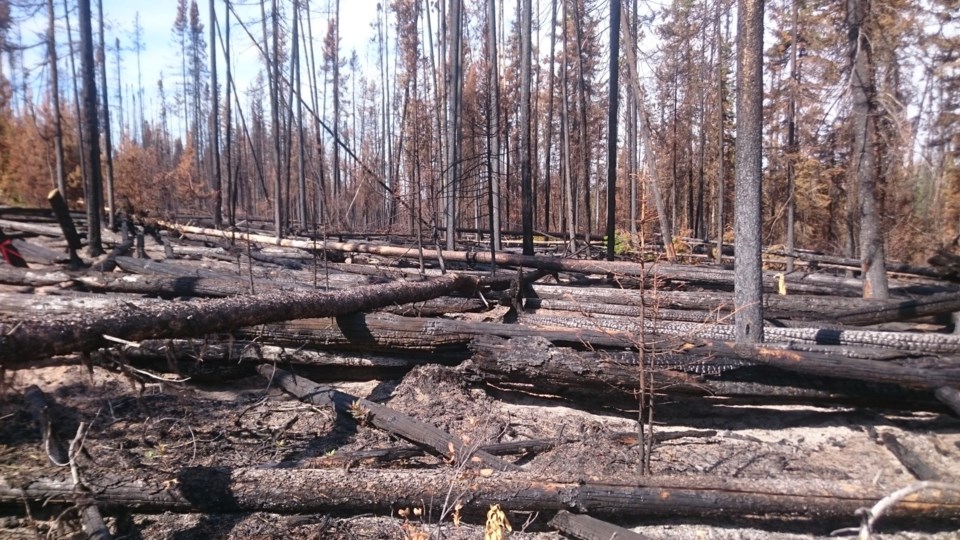There were days in the B.C. Interior this summer when day turned to night, the sun obliterated by smoke. The lush landscape turned apocalyptic, blanketed in the thick smog of hundreds of wildfires.
Ash and the curled, black remnants of pine needles drifted from the sky like rain.
The 2017 fire season in B.C. was the fourth costliest wildfire disaster on record… until now. The insurance claims for losses that year amounted to $137 million, according to a 2020 review of wildfire management in Canada.
The 2003 Kelowna wildfires cost $252 million in insurance claims. Even that is dwarfed by the Horse River Wildfire in northeastern Alberta in 2016, which cost $3.84 billion, making it the costliest natural disaster in Canadian history. The 2011 Slave Lake fires cost $865 million.
This year will be worse than 2017 for B.C. And within a few years, worse yet again.
Every recent report, review, and analysis of wildfires comes to the same conclusion: we will see increasing wildfire activity. B.C., and all of Canada, needs to transform the way we manage these disasters.
“The projected impacts of climate change include longer wildfire seasons, increasing fire weather severity, increasing wildfire occurrence, and increasing fire intensity and area burned,” says the Wildfire Management Review published in January 2020.
“Under low and high climate change scenarios, suppression costs are projected to increase by 60% and 199% respectively.”
In other words, we can’t afford not to change the way wildfires are fought in this province.
A report for the B.C. government into the 2017 fire season had much the same message:
“As in other parts of the world, climate change is having a profound effect on British Columbia. In 2017, extreme weather events prompted floods, debris flow and wildfires in several corners of our province, causing severe damage in their wake,” says Addressing the New Normal: 21st Century Disaster Management in British Columbia.
That report made 108 recommendations, some of which have been put in place but not nearly enough.
Evacuees were still looking for shelter this summer when the finger-pointing began, of course. Climate change or poor management of forests? Lack of resources or unrealistic expectations? Underfunding or failure to adapt?
The answer is all of the above and then some.
The schism between the provincial government, B.C. Wildfire Service, and local governments was very apparent in the failure of the province to respond immediately to calls for a provincial state of emergency.
The lack of resources was apparent as the provincial Wildfire Service, even with their world-class expertise and fearless work ethic, were overwhelmed by the sheer number and ferocity of the fires.
The lack of planning and preparedness was apparent in the chaotic evacuations, with some of the displaced left with no idea where to go, or whether there would be a warm bed and a meal when they got there.
This summer has left many of us shaken.
The feeling in the Interior and Okanagan that B.C. has a Metro Vancouver and Vancouver Island government with little interest in what happens beyond the 604 was not helped by the glaring absence of the premier or cabinet ministers throughout our ordeal.
Both the 2020 federal review and the provincial review of the 2017 fire season came to much the same conclusions: fires will get worse and more frequent, funding and preparation are inadequate, and we need major transformation in the way we approach them.
“Progress is being made to adapt incrementally to increasing wildfire threats as they arise, but a horizon scanning and foresight report by MNP suggests the problem will get much worse. Wildfire impacts are likely to intensify as Canada's climate continues to warm at twice the global warming rate,” says the national review.
“Agencies therefore need to move from short-term fixes to transformational change to address the long-term picture.”
Unfortunately, I think we’ll have a chance to test that theory again sooner rather than later.
Dene Moore is an award-winning journalist and writer. A news editor and reporter for The Canadian Press news agency for 16 years, Moore is now a freelance journalist living in the South Cariboo. Moore’s two decades in daily journalism took her as far afield as Kandahar as a war correspondent and the Innu communities of Labrador. She has worked in newsrooms in Vancouver, Montreal, Regina, Saskatoon, St. John’s and Edmonton. She has been published in the Globe and Mail, Maclean’s magazine, the New York Times and the Toronto Star, among others. She is a Habs fan and believes this is the year.
SWIM ON:
- Dene Moore: Scenes of a triumphant Taliban will stay with us – and they should, because we abandoned our friends and allies to a terrible fate.
- Don't miss Daniel Marshall’s three-day flurry into the fire-stricken lands of the BC Interior.
- The first job of leadership is showing up, telling people the latest, and how you have their backs. But as much of BC burns, unfortunately John Horgan didn't show up, says Drex.



